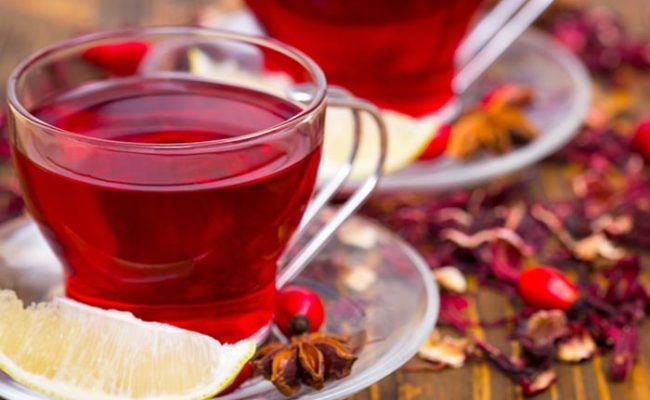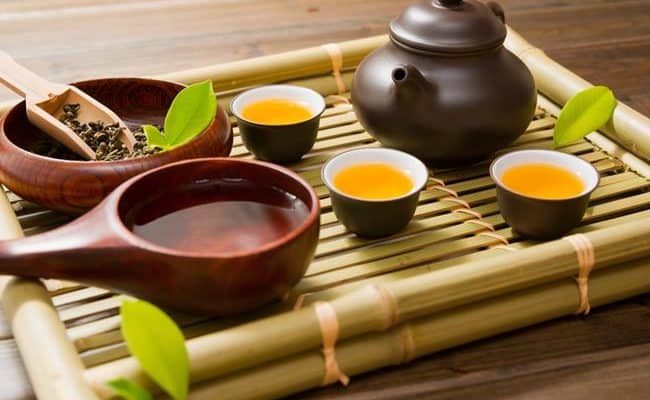
Thyme has been used for centuries not only as a flavorful cooking herb but also for its medicinal properties. Ancient Greeks, Romans and Egyptians used thyme for incense, embalming or for anecdote for various conditions.
With the increase use and popularity of essential oils, thyme oil is also now growing in popularity for various anecdotes.
Some claims associated with thyme essential oil are backed up with research, but others are lacking. For example, a claim (1) for thyme essential oil suggests it can support a healthy immune system.
However, there isn’t research to support this claim.
Drinking thyme tea can be one way to enjoy the health benefits of thyme. Like other teas, thyme tea can be a good source of antioxidants.
Some studies have also shown thyme may help lower high blood pressure. Therefore, drinking thyme tea may also provide these health benefits.
Most of the research with thyme or thyme tea is in vitro or animal studies, so more research is needed.
However, the results from these studies suggest thyme may have a beneficial effect on blood sugar and blood pressure.
Herbs are some of the highest sources of antioxidants from food. Most people in Western cultures don’t use a significant amount of herbs in their diet, just a little for flavoring.
Incorporating more herbs whether fresh, dried or steeped as tea can help bump up antioxidant intake.
Thyme tea can be made by simply steeping a few springs of thyme in 10-16 ounces of hot water for about 15 minutes. Drinking thyme tea can be a caffeine free alternative for black or green teas.
Blood pressure
A 2013 study (2) analyzed antioxidant and anti-hypertensive capacity for water solutions of thyme.
Researchers found the thyme solution when given to hypertensive rats did significantly lower blood pressure.
This study suggests thyme may help lower blood pressure and may be a health benefit of drinking thyme tea. However, more research is needed in humans with thyme and the effect it has on blood pressure.
Drinking thyme tea is not a magic bullet for automatically lowering blood pressure. Drinking thyme tea in addition to other dietary changes like increasing fruits, vegetables and lowering processed foods would be best for trying to lower blood pressure.
Antioxidant source
Herbs and spices are some of the richest sources of antioxidants (3). Even though they are rich in antioxidants, we usually only use a small amount of them in our diet typically just for flavoring foods.
Therefore, other plant foods like legumes, whole grains, nuts, seeds, fruits and vegetables usually contribute most antioxidants in the diet.
Drinking thyme tea and using more herbs when cooking can increase dietary antioxidants from the diet.
Some of the top herbs for antioxidant capacity are: cloves, peppermint, allspice, cinnamon, oregano, thyme, sage, rosemary and saffron.
The good news if you use dried herbs is the antioxidant capacity is left in tact.
A 2008 study (4) from Turkey also concluded thyme tea was third out of 10 teas tested for antioxidant capacity.
Researchers analyzed tea extracts on in vitro glucose absorption and antioxidant activity. While there was no significant effect for glucose absorption, this study did show tea extracts to have antioxidant effects.
Other teas besides thyme showing a positive effect were green, black and peppermint.
Protecting LDL cholesterol from oxidation
A 2009 study (5) found tea infusions from oregano, thyme and wild thyme did protect LDL cholesterol from oxidation.
When LDL gets oxidized, it can increase inflammation and risk for cardiovascular disease. Therefore, protecting LDL cholesterol from oxidation can help lower risk for cardiovascular disease.
Other research (6) suggests extra virgin olive oil may also help protect LDL cholesterol from oxidation.
Therefore, combining olive oil and thyme in a meal may prove to be a heart healthy combination at meal times.
Cancer risk
Free radicals can cause damage to body cells and their DNA. At high doses, free radicals may increase risk for damage to cells that can lead to an increased risk for cancer.
Antioxidants can help protect cells from damage caused by free radicals. Therefore, increasing antioxidant intake from the diet is recommended for potentially lowering risk for certain cancers.
However, the research around taking antioxidant supplements and cancer risk does not suggest supplemental antioxidants are beneficial for lowering cancer risk (7).
Research is on-going for understanding the relationship antioxidants from food sources has on cancer risk. Certain foods high in antioxidants, like thyme, may have potent compounds that can help fight off carcinogens.
A 2012 in vitro study (8) found wild thyme extract did induce cytotoxicity in breast cancer cells. While more research is needed, this study suggests thyme could potentially help fight breast cancer and possibly other cancer cells.
A 2010 study (9) analyzed the effect 10 essential oils had on in vitro cancer cell growth. This study found thyme oil to have the strongest cytotoxicity towards the cancer cells.
Conclusion: Thyme tea health benefits
Adding more herbs to your diet can offer many health benefits. Thyme and other herbs are rich antioxidant sources which may help protect cells from damage caused by free radicals.
These antioxidants can also protect LDL cholesterol from oxidation which can lower risk for cardiovascular disease.
A study found a water solution with thyme significantly lowered blood pressure in hypertensive rats. More research is needed, but this study suggests thyme may have the same effect in humans.
Like any other food or drink, drinking thyme tea is not a magic bullet. Adding thyme tea to your diet can provide health benefits, but drinking it by itself can’t be a substitute for following a healthy, balanced diet.
If someone is sensitive to caffeine, drinking thyme tea is place of green or black tea can offer a caffeine free alternative. To make thyme tea you can simply steep some sprigs of thyme in hot water.










